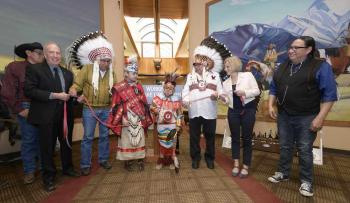Image Caption
Summary
By Shari Narine
Windspeaker Contributor
EDMONTON
Alberta’s Regional Chief for the Assembly of First Nations is concerned about the impact a provincial budget so dependent on revenue from pipelines, especially the much contested Trans Canada, could have on Indigenous peoples if those projects fail to materialize.
“What is the contingent plan to deal with that, the fall out of it, and how would that impact Indigenous people in the budget?” said Regional Chief Marlene Poitras.
But the government is no longer depending solely on the rollercoaster gas and oil industry, says Minister of Indigenous Relations Richard Feehan.
“We’re going to be diversifying the economy in strong ways. We’re going to maintain the essential services and we’re going to help Albertans get into a new way of being that doesn’t include these drastic drops in our economy like we experienced in 2014, ‘15, ’16,” he said.
Particularly exciting to Feehan is the additional $15 million the Indigenous Climate Leadership Initiative has received, jumping to $50 million this new fiscal year, to fund green power initiatives by Indigenous communities and provide equity for such developments.
It’s something the Paul First Nation is looking to get on top of. With their revenue and impact assessment agreement funding from TransAlta Utilities from coal mining to run out in three years, Councillor Aaron Bird says Paul First Nation is hoping to partner with four or five other First Nations to combine their equity to fully bankroll a single green project.
On Tuesday, Louis Bull Tribe did a ribbon cutting for solar panels installed on their administrative building and the community health and wellness building. These and future modifications are covered under the Alberta Indigenous Energy Efficiency (Retrofits) Program.
Close to 125 climate leadership programs were undertaken by Indigenous communities last year, says Feehan.
“They’re taking care of the environment at the same time that they’re taking care of their people and that’s a pretty good combination,” he said.
Other budget highlights include continued funding for safe water on reserves, which is a federal responsibility. Alberta is the only province that has stepped up, says Feehan, because “we just got tired of waiting” for the federal government.
“In First Nations communities there’s just a serious lack of funding in all areas and for anything they can do to help, it’s a good thing,” said Poitras.
The budget also calls for more cooperative management of Alberta’s parks with Indigenous peoples, a process which was rolled out with the new Castle Mountain Park and the Piikani Nation.
While there are no specifics, Feehan says the government will be moving forward with child welfare reform.
“I’ve had a number of quite lengthy conversations with (Child Welfare) minister (Danielle) Larivee about the reality of child services in this province. Both of us are deeply committed to making some huge changes, and making sure that Indigenous kids are not over-represented in terms of coming into care. So that means we need to be putting services for families out there in the communities,” he said.
Money has also been committed—$80 million over three years—to include Indigenous history, perspectives, treaties and agreements in kindergarten to Grade 12 education, and grant funding for Indigenous students.
But more than the specific dollars set aside and for Indigenous programs and services in the Indigenous Relations budget at $244 million, Feehan points out that over half of the province’s First Nations people live off reserve.
“We’re making sure our response to the Indigenous community is pan-governmental and not just funneled through a single ministry,” he said.
“It’s an increased focus we have. Every ministry now, one of the things they have to do whenever they bring forward proposals, they have actually a section that says how is this going to affect the Indigenous people in this province,” said Feehan.
He points to the building of schools and hospitals, increased funding in school nutrition programs, additional $25 per day daycare spaces, more funding for policing as well as maintaining “vital programs” as a benefit for Indigenous peoples.
“I think it’s important that the Indigenous community understand that all of those kinds of services are there for them. Schools and hospitals are pretty central to what’s happening,” he said.
While Poitras believes that there is a value to a pan-government approach in dealing with the needs of Indigenous peoples as so many live off reserve, she says she would like to see more off-reserve services tailored to Indigenous peoples.
“It would be more beneficial and it would improve relations if there was more specific services geared to off-reserve First Nations,” she said. “There are lots of attempts being made … but off-reserve is not only within the large urban areas, but there’s also the smaller towns that a lot of First Nations people migrate to. It needs to be looked at from a broader perspective.”
Poitras also points out that First Nations people are not pleased to be included in a pan-Indigenous approach.
“When First Nations deal with any government … our foundation is treaty,” said Poitras. “When we get included in a pan-Aboriginal approach that dilutes that process. But we have a treaty and we need to be treated on a nation-to-nation basis based on that treaty.”
But despite her concerns, Poitras speaks highly of the Rachel Notley government and Feehan, in particular.
“The budget is a good start. We have to sit down and talk and work together in improving the lives of First Nations people and I believe that this government is attempting to work towards that,” said Poitras.

